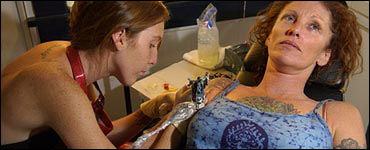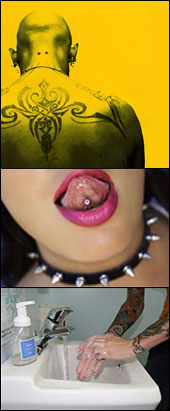CDC Features
Current Features
Health and Safety of Tattoo Artists, Body Piercers, and Their Clients

Body art is a popular form of self-expression. Tattoos and body piercings are typically created by professional tattoo artists and body piercers and appear on the body as permanent markings and decorative metal.
Health and safety procedures for body artists may be regulated by city, county, or state agencies. Reputable shops and tattoo parlors govern themselves and follow strict safety procedures to protect their clients – and their body artists.
Considering Body Art?

If you decide to get a tattoo or body piercing, make sure you go to a licensed facility and take time to discuss the safety procedures with the artists working at the shop or tattoo parlor. They should explain the process and clarify what they do to keep everyone safe and healthy by using sterile needles and razors, washing hands, wearing gloves, and keeping surfaces clean.
Safety Procedures
Body piercers and tattoo artists protect themselves and their clients when following safe and healthy practices, such as:
• Use single-use, disposable needles and razors. Disposable piercing needles, tattoo needles, and razors are used on one person and then thrown away. Reusing needles or razors is not safe.
• Safely dispose of needles and razors. Used needles and razors should be thrown away in a biohazard-labeled, disposable container to protect both the client and the person changing or handling the trash bag from getting cut.
• Wash hands before and after putting on disposable gloves. Gloves are always worn while working with equipment and clients, changed when necessary, and are not reused.
• Clean and sterilize reusable tools and equipment. Some tools and equipment can be reused when creating body art. Reusable tools and equipment should be cleaned and then sterilized to remove viruses and bacteria.
• Frequently clean surfaces and work areas. Chairs, tables, work spaces and counters should be disinfected between procedures to protect both the health of the client and the artist. Cross-contamination (spreading bacteria and viruses from one surface to another) can occur if surfaces are not disinfected frequently and between clients. Any disinfectant that claims to be able to eliminate the tuberculosis germ can also kill HIV, hepatitis B and hepatitis C viruses. Use a commercial disinfectant, following the manufacturer’s instructions, or a mixture of bleach and water (1 part bleach to 9 parts water).
For more safe and healthy practices, please see Preventing Needlestick Injuries.
By following safety procedures, tattoo artists and body piercers protect themselves and their clients against exposure risks such as:
• Viruses, germs, and bacteria that can cause infections
Additional Information for Body Artists
- Safety Information for Tattoo and Body Piercing Artists
- Organizations Involved in Identifying Bloodborne Pathogen Exposure Risks in the Body Art Industry
- Body Art Information Post Cards
- Sterilization or Disinfection of Patient-Care Equipment
- About Small Business, helping small business owners, employers, and managers deal with occupational safety and health concerns
- Wash Your Hands
- Association of Professional Piercers*
Additional Information for Clients
- Can I Get HIV From Getting a Tattoo or Through Body Piercing?
- Piercings and Tattoos, MedLinePlus
- Tattoos and Permanent Makeup, US Food and Drug Administration
- Think Before You Ink: Are Tattoos Safe?, US Food and Drug Administration
Page last updated: January 21, 2008
Content source: National Institute for Occupational Safety and Health (NIOSH) and Divisions of HIV/AIDS Prevention, National Center for HIV/ADIS, Viral Hepatitis, STD, and TB Prevention
Content owner: National Center for Health Marketing
URL for this page: www.cdc.gov/Features/BodyArt
*Links to non-federal organizations are provided solely as a service to our users. These links do not constitute an endorsement of these organizations or their programs by CDC or the federal government, and none should be inferred. CDC is not responsible for the content of the individual organization Web pages found at these links.

